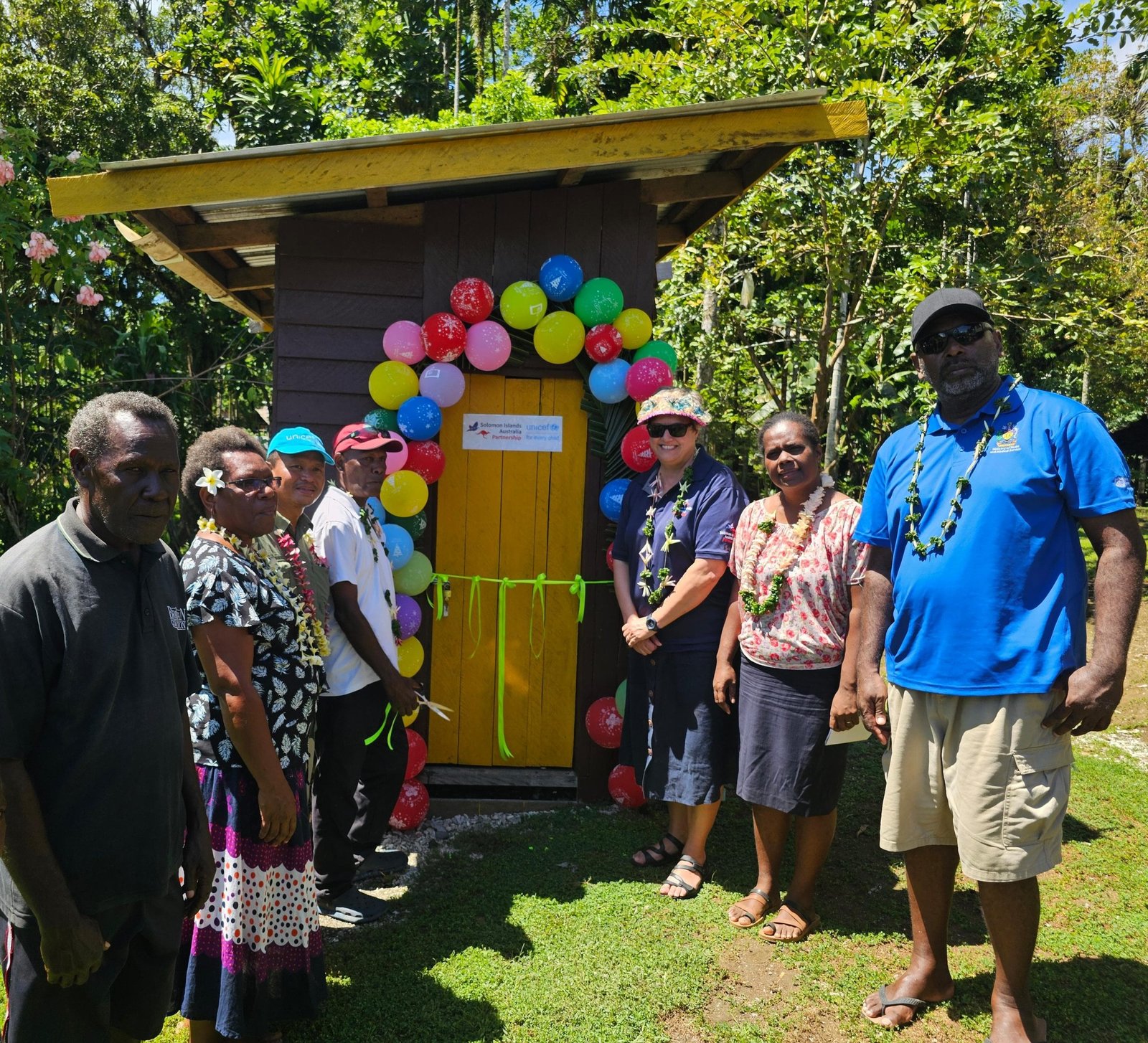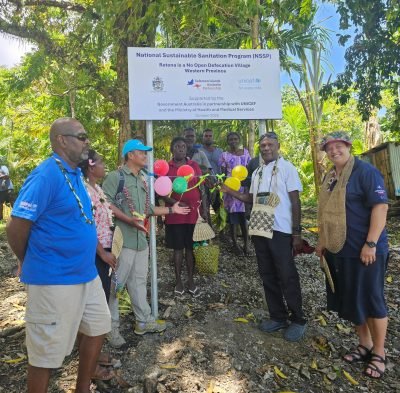
Western Province Declared ‘No Open Defecation’ in Seven Villages
The Ministry of Health and Medical Services (MHMS) in collaboration with the Australian Government through the Department of Foreign Affairs and Trade (DFAT) and UNICEF, today celebrated a major milestone – the declaration of seven additional ‘No Open Defecation’ (NOD) villages in Western Province.
The declared NOD villages are Pine, Patupaele, and Ilitona Village in Kolombangara as well as Babaghea, Retona, Central Buri and Logha in the Ranongga Island.
This forms part of the achievements of the National Sustainable Sanitation Plan (NSSP), being implemented in 3 provinces – Malaita, Western, and Central Islands.
With these new declarations, Western Province now has 31 NOD communities contributing to an overall NSSP achievement of 173 NOD villages across the 3 provinces.
This has been made possible through the funding support from the Australian Government. With this support, over 4,000 household toilets have been constructed, providing improved sanitation access to over 21,000 people and contributing to healthier villages and better public health outcomes.

The Western Province has previously endorsed the costed NOD Plan which aims to ensure that all institutions and households in the province have a basic sanitation facility. This plan focusses on reducing feacal-oral diseases, especially diarrhoea, and improving the health of children, their mothers and their communities. As one of the country’s main tourist destinations, Western Province it contributes significantly to the local economy, and it is committed to creating a more hygienic and safe environment for the inhabitants and visitors.
A lack of access to sanitation has real human costs, leading to preventable diseases, malnutrition and deaths, especially among children. Recent studies and analysis show a strong link between open defecation and childhood stunting, which impacts negatively on cognitive development and future economic productivity.
Honourable George Kenneth, Health Minister of Western Province Government, Ms. Ethel Mopulu, Environmental Health Director at the Ministry of Health and Medical Services, Dr. Dickson Boara, Western Province Health Director, Ms. Elise Newton, First Secretary to Health at the Australian High Commission and Basilius Kris Cahyanto, UNICEF WASH Programme Specialist in Solomon Islands, and Ms. Sharon Kele, ADRA Programme Manager were in attendance to launch the activities.
The ceremony and related activities to declare the no open defecation villages were organized and facilitated by the Rural Water, Sanitation and Hygiene (RWASH) of the Western Provincial Government and the Ministry of Health and Medical Services. Seven villages, two wards, village leaders, partners and community representatives all participated.
Community awareness, demand creation for better access to sanitation facility, and ownership are crucial in moving away from open defection toward toilet use, and Community-Led Total Sanitation (CLTS) is a globally recognized approach to help communities live in a safe and clean environment.
“This project is a powerful example of Australia’s commitment to locally led development —championing locally led initiatives and homegrown solutions to community challenges. It’s through this kind of partnership that we can create lasting impact and build healthier, safer environments for generations to come.” says Ms. Elise Newton, First Secretary to Health, Australian High Commission.
In Solomon Islands, diarrheal diseases remain the top cause of infant and child mortality, both of which are strongly linked to inadequate sanitation and hygiene practices. As such, similar activities to those launched today in Western Province, were also implemented in Malaita Province and Central Islands Province.
“I encourage all communities to draw inspiration from Babaghea and Refona village’s success. Together, let us work toward a cleaner, healthier, and more resilient Solomon Islands,” says Ms. Ethel Mopulu, MHMS Environmental Health Director
“Sanitation and hygiene are crucial not only for improve health and nutrition, but also for better dignity, protection, environment, , and safety among children, especially girls” UNICEF WASH Specialist added.
These joint efforts by the Ministry of Health and Medical Services (MHMS), the Western Province, UNICEF and the generous financial support from the Australian Government are part of a long-term strategy to improve the health, nutrition and overall wellbeing of every child in Solomon Islands, as well as their families and communities.
ENDS//
-MHMS and UNICEF Joint Press Release
